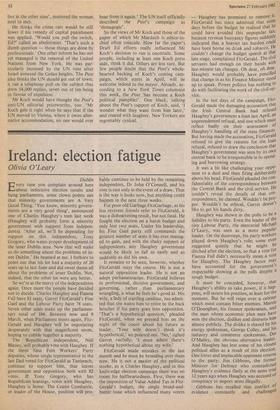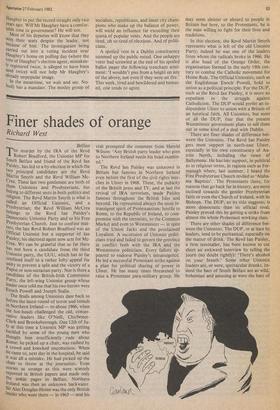Ireland: election fatigue
Olivia O'Leary
Dublin Every time you complain around here about indecisive election results and hung parliaments, some clown points out that minority governments are A Very Good Thing. 'You know, minority govern- ments are a very good thing', announced one of Charles Haughey's men last week (Haughey will probably form a minority government with support from indepen- dents). 'After all, we'll be depending for support on this independent, Tony Gregory, who wants proper development of the inner Dublin area. Now that will make us do something about the problems of in- ner Dublin.' He beamed at me. I forbore to point out that his lot had a majority of 20 seats up to last June and did sweet damn all about the problems of inner Dublin. Not, indeed, that the other lot were any better.
So we're at the mercy of the independents again. Once more the people have decided not to decide. Charles Haughey and Fianna Fail have 81 seats, Garret FitzGerald's Fine Gael and the Labour Party have 78 seats. Seven other seats make up the parliamen- tary total of 166. Between now and 9 March, when Parliament meets again, Fitz- Gerald and Haughey will be negotiating desperately with that magnificent seven, hoping to cobble together a majority.
The Republican independent, Neil Blaney, will probably vote with Haughey. If the three Sinn Fein Workers' Party deputies, whose single representative in the last Dail voted for FitzGerald as Taoiseach, continue to support him, that leaves government and opposition both with 82 votes. If Tony Gregory, who has Rupublican leanings, votes with Haughey, Haughey is home. The Ceann Comhairle, or leader of the House, position will pro-
bably continue to be held by the remaining independent, Dr John O'Connell, and his vote is cast only in the event of a draw: That is the way it looks now, but anything could happen in the next three weeks. For poor old Garbage FitzGarbage, as his less reverent friends refer to FitzGerald, it was a disheartening result, but not fatal. He fought the election on a harsh budget and only lost two seats. Under his leadership, his Fine Gael party still commands the greatest number of seats it has ever manag- ed to gain, and with the shaky support of independents any Haughey government would be likely to fall as easily and as suddenly as did his own. It remains to be seen, however, whether FitzGerald stays the course. He is not a natural opposition leader. He is not an adept parliamentarian. FitzGerald believes in professional, decisive government, and goVerning, rather than parliamentary wrangling, is what he feels he's good at. His wife, a lady of startling candour, has admit- ted that she wants him to retire to the back benches if his party goes into opposition. 'That's a hypothetical question,' pleaded FitzGerald, when we pressed him on the night of the count about his future as leader. 'Your wife doesn't think it's hypothetical,' we pointed out. 'No,' sighed Garret ruefully; 'I must admit there's nothing hypothetical about my wife.'
FitzGerald made mistakes in the last month and he must be brooding over them now. He is not a master of the political stroke, as is Charles Haughey, and in this knife-edge election campaign there was no room for halfheartedness. First, there was the imposition of Value Added Tax in Fitz- Gerald's budget, the single bread-and- butter issue which influenced many voters — Haughey has promised to remove it. FitzGerald has since admitted that some days before the budget he realised that he could have avoided this unpopular tax, because revenue buoyancy figures suddenly indicated that a heavier tax burden could have been borne on drink and tobacco. He couldn't change the budget speech at that late stage, complained FitzGerald. The civil servants had enough on their hands with last-minute tax changes. Oh dear, oh dear. Haughey would probably have pencilled that change in as his Finance Minister stood up to speak. Power politics has nothing to do with facilitating the work of the civil ser- vice.
In the last days of the campaign, Fitz- Gerald made the damaging accusation that the Irish Central Bank had refused Haughey's government a loan last April, an unprecedented refusal, and one which must reflect badly on their assessment of Haughey's handling of the state finances. But having made the accusation, FitzGerald refused to give the reasons for the loan refusal, refused to draw the conclusion that Haughey's government was seen by its own central bank to be irresponsible in its spend- ing and borrowing strategy.
It was a bit like challenging your oppo- nent to a duel and then firing deliberately above his head. FitzGerald pleaded the con- fidentiality of the correspondence between the Central Bank and the civil service. He couldn't reveal the details of that cor- respondence, he claimed. Wouldn't be pro- per. Wouldn't be ethical. Garret doesn't like to get his hands dirty.
Haughey was shown in the polls to be a liability to his party. Even the leader of the tiny Labour Party, the mercurial Michael O'Leary, was seen as a more popular leader. On the doorsteps, his party workers played down Haughey's role; some even suggested quietly that he might be ditched after the election, so that a vote for Fianna Fail didn't necessarily mean a vote for Haughey. The Haughey factor maY have accounted for the government's respectable showing at the polls despite a tough budget.
It must be conceded, however, that Haughey's ability to take power, if it hap- pens, will secure his position, at least for the moment. But he will reign over a cabinet which must contain bitter enemies. Martin O'Donoghue, his finance spokesman, and the man whose economic plan may have won the election, dislikes and distrusts him almost publicly. The dislike is shared by his energy spokesman, George Colley, and his industry and commerce spokesman, Des O'Malley, the obvious alternative leader. And Haughey has lost some of his closest political allies as a result of this election. One bitter and implacable opponent returns to the party: Jim Gibbons, the former Minister for Defence who contradicted Haughey's evidence flatly at the arms trial 12 years ago when Haughey was accused of conspiracy to import arms illegally. Gibbons has recalled that conflict of evidence constantly and challenged Haughey to put the record straight only two Years ago. Will Mr Haughey have a comfor- table time in government? He will not. Most of his deputies will know that they won their seats despite the leader, not because of him. The investigation being carried out into a voting incident near Haughey's home on polling day (where the vote of Haughey's election agent, mistaken- ly registered twice, is alleged to have been used twice) will not help Mr Haughey's already unpopular image. In the meantime, we wait and see. No- body has a mandate. The motley group of socialists, republicans, and inner city cham- pions who make up the balance of power, will wield an influence far exceeding their quota of popular votes. And the people are tired, oh so tired of elections. And of politi- cians.
A spoiled vote in a Dublin constituency summed up the public mood. One unhappy voter had scrawled at the end of his spoiled ballot paper the following trenchant senti- ment: 'I wouldn't piss from a height on any of the above, not even if they were on fire.' This week, tired and bewildered and bemus- ed, one tends to agree.





































 Previous page
Previous page